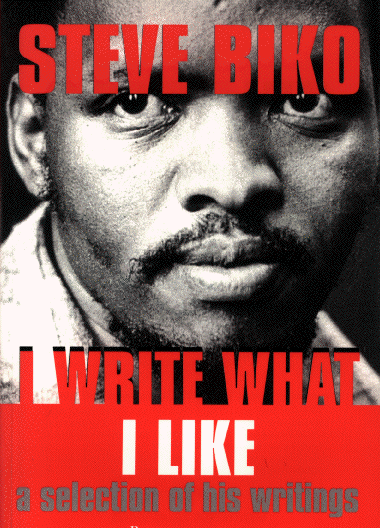I Eat Sushi Where I Like – Revisiting Steve Biko

Steve Bantu Biko came way ahead of his time – when one analyses what has been happening in this country in recent history; the political Black on Black killings in Mpumalanga, the political literal back-stabbings in the Western Cape, the traction in COPE and the self-hate that has engulfed the Black middle class since 1994.
Maybe Biko came in time before the crass materialism and vulgarity of excess that characterises our democratic order could poison his altruistic spirit. We have seen great men drink from the fountain of greed and become beasts we never knew existed. I Write What I Like, a collection of his essays is still in need of a peer. Those who tried to undo the good work wrote dodgy capitalist encyclopaedias such as Capitalist Nigger (Chika Onyeani) and Architects of Poverty (Moeletsi Mbeki). Biko provided a benchmark at times bigger than his own influences such as Franz Fanon, W.E.B du Bois and Malcolm X. For anyone who has indulged Biko's nectar and those of his ilk it is undoubted that earlier nationalists and social scientists fed a lot into his muse.
For a man who was as well-read as Biko the language deployed in articulating the role of Black people in apartheid South Afrika is lucid. It's often contrary to what modern intellectuals, often communists resort to; of using verbose language that tends to lose the reader even thought the aim of any written word is to be read. Biko's simplicity is difficult to understand given that the late ‘60s and seventies were characterised by a proliferation of revolutionaries as Harold MacMillan’s winds of change were sweeping not only Africa but Latin America and the Middle East. With Palestinians, Sandinistas, Che Guevaras and Ayatollahs (bubbling under) all in their element, Biko crafted his message to speak to Black South Afrikans but with a solidarity theme that would have inspired Palestinians in a refugee camp to continue fighting.
It is a message of universal self-love rather than pan-Africanism. It’s not Black consciousness for the sake of social expediency but also to hand over humanity to an oppressor. Biko noticed that the oppressor was also a victim of their sense of self-importance. He spoke to them in a language they were comfortable using against Blacks. He realised that all oppressors the world over needed was to be brought back to mother earth and admit that they were not the most intelligent folks simply because they were born 'white'. "No race has a monopoly to wisdom", an earlier philosopher echoed.
The literary merit of Biko's work is unquestionable to the extent that it beats me why do we have Durban University of Technology Steve Biko Campus and Memorial Hospital while this book; which should be prescribed for all school grades; from eight to 12 is in the fringes. I still have to see an indigenous language translation of this book sponsored by the Language Board. I still need to see one essay used during the Grade 12 examinations. To navigate the future in harmony both Black and white children need to find themselves between the pages of this beautiful narrative. There's nowhere in the book where Biko says, 'fuck white people. I hate white people. I detest white people'
Nation-building needs not denote shying away from peeling scabs to expose the pus and clean the wound but to be able to prescribe amputation if it’s the best solution. South Afrika has a lot of septic wounds that need attention. Like chemotherapy it will hurt to some white people but one rather live without a bad tooth than to endure unnecessary pain caused by a dying doctrine. Apartheid, in Biko's mind was never really feasible; sad that it took Boers so long to notice that.
Biko didn’t need to be creative like artists as this book is made up of essays and letters he wrote for the consumption of different people. However in his twenties Biko had enough brain cells in his head to put to shame some 40-years old (who loves eating sushi ontop of naked women) who would write long diatribes to respond to Biko saying, “material want is bad enough; coupled with spiritual poverty it kills” [page 30]. I hope Kenny Kunene reads; not only this post but Biko's book as well.



















No comments:
Post a Comment
Dear Commentator
Kasiekulture encourages you to leave a comment and sensitize others about it. However due to spammers filling this box with useless rhetoric that has nothing to do with our posts we have now decided that to comment you have to go to our Facebook Page titled THE Kasiekulture BLOG. We will not authorise any comments. Apologies for the inconvenience.